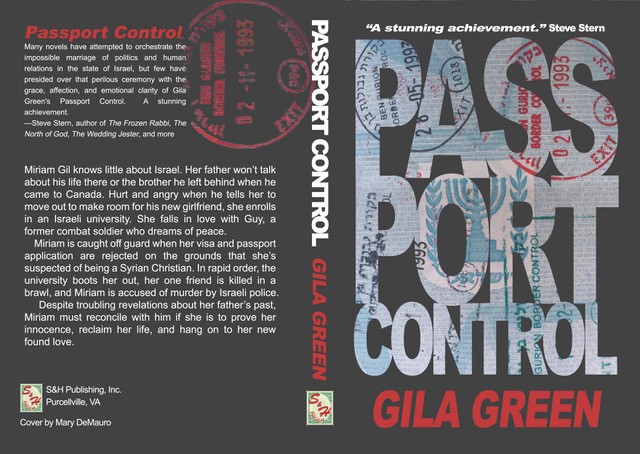When Your Book Disappears: Reflections on Passport Control, Publishing, and the New Year
apartment, I see a student who looks about twenty-five
eating a diced tomato, cucumber, and onion salad on a
plate. She scoops the salad into her pita, which
immediately reminds me of my father. I don't know
what else she's eating. Maybe hummus, maybe that thin
white cheese spread my father's always running out of.
Behind her is a large window that looks all the way
down to Haifa Bay, and her chair is so centered at the
table, she appears framed by the view.
She has long, not quite black hair that reaches her
waist; brown eyes; pale, pock-marked skin, and is plain
looking. She's wearing a long-sleeved eggplant-colored
tunic.
She smiles at me, and I smile back and close the door
behind me, lugging my suitcase with one hand and my
carry-on with the other. She says hello, barely pausing
between bites. I recognize the sour aroma of goat cheese
and zaatar from my own kitchen at home, but I try not to
stare at her plate. Anything besides coffee and plain toast
in the morning sinks my stomach into my legs.
"I'm Farzeen," she says.
"Miriam."
"Where are you from?" she asks.
"Canada."
"That's good news. I knew it would be a good day. A
Canadian. Now someone who sees clearly will be living
here from the outside world."
I wonder what that means. Someone who hasn't
done the army? Who hasn't been trained like Ben Gurion
Airport security to raise her internal antennas at the
sound of an Arabic accent like hers?
"I've never actually met a Canadian before," she
continues. "Have you ever met a Palestinian?"
"My father has many Arab friends. Egyptian,
Lebanese."
"Really?"
"He spoke Arabic growing up in Jerusalem."
Farzeen moves her salad around her plate, drops her
fork, and brings her long fingers together.
"But you don't speak Arabic?"
"No. In Canada we learn French and Hebrew at
school."
"French? Of course," she says. "Would you like to eat
with me? Please, you just got off the plane. Sit."
Salad at dawn. Exactly like my father's intolerable
idea of breakfast. I'll never get it down, but I don't want
to seem unfriendly.
She points to the chair across from her, and I sit."
As we approach Rosh Hashanah, a time for reflection and renewal, I find myself contemplating not only personal growth but the strange and ironic journey my novel, Passport Control, has taken. Just recently, I discovered that Passport Control had quietly vanished from my publisher's website. The publisher, who retired a few years ago, still maintains a list of books and authors on her site—except mine.
How did I find this out? It wasn't during my own routine checks but because a book club in the U.S. reached out, asking for more copies. Naturally, I contacted the publisher, remembering that she had asked me a few years ago if I wanted back copies when she retired. But to my surprise, not only were the copies no longer available, my book had seemingly disappeared from existence.
The irony is rich, especially in light of something I wrote about recently: the erasure of Jewish stories from public discourse. I had been canceled by one of the big five publishers for refusing to erase the Jewish identity of my heroine. It was this very identity that caused my novel to be rejected by the mainstream, yet accepted by a pro-Palestinian publisher—someone who spent over a decade living in a Palestinian town, married a Palestinian, and is deeply involved in activism. Her openness to publish a book she didn't fully agree with, because she believed in the power of good stories, was a rare and valuable gesture in today's divided world.
And yet, here I am, six years later, with my book no longer acknowledged.
As I reflect on this during Rosh Hashanah, a time of renewal and return, I'm struck by how fitting it is that I want to republish Passport Control now. The novel tells a story that resonates with what our world desperately needs—Jewish, Palestinian, and Druze characters all living together, navigating their complexities and differences, yet sharing the same land and fate. It's a narrative of coexistence, identity, and the messiness of truth, a theme we need more than ever in these divisive times.
It's also ironic, as I sit here reflecting on the disappearing stories of Jewish life, that I'm determined to give Passport Control a new life. Despite the obstacles, despite the erasure, I feel it's more important than ever to bring this novel back into the world. This is not just a story of one people but of many, and the act of republishing it feels like my own personal act of resilience and renewal—a fitting endeavor for the Jewish New Year.
I also want to take a moment to express my gratitude to the book clubs—both in the U.S. and Israel—who continue to discuss Passport Control to this day. Your commitment to keeping the story alive, even when its place in the publishing world seems uncertain, is incredibly meaningful to me. You are part of the reason why I feel renewed motivation to bring this novel back.
Rosh Hashanah reminds us of the cyclical nature of time and opportunity. Even when something seems lost, there's a chance for renewal, for bringing what's valuable back to the forefront. And as we enter this new year, my wish is that we find ways to bring these stories—stories that are complex, nuanced, and filled with diverse voices—back into the world.
Shanah Tovah—may it be a year of new beginnings, for us and for the stories we tell.
When you subscribe to the blog, we will send you an e-mail when there are new updates on the site so you wouldn't miss them.


Comments